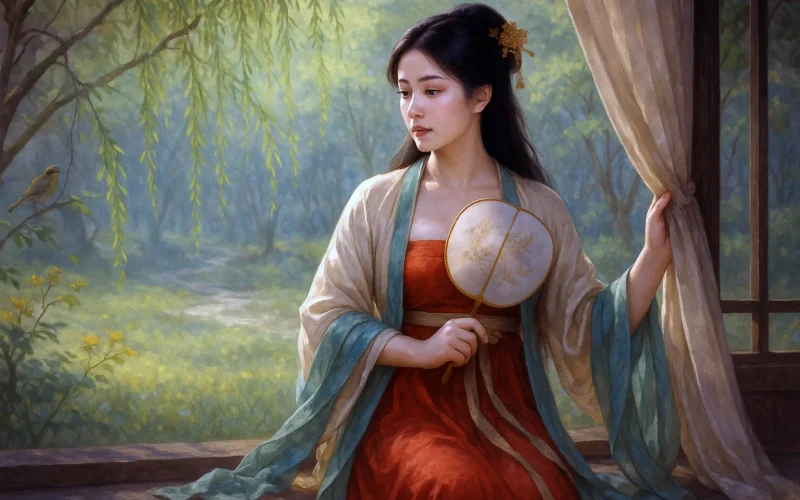In setting sun's glow on the river clear,
Chu songs arise from maidens slender and dear.
Lotus-gathering's their habit from early years,
At fifteen they already ride the tide without fears.
Original Poem
「采莲曲」
刘方平
落日清江里,荆歌艳楚腰。
采莲从小惯,十五即乘潮。
Interpretation
"The Lotus-Gathering Song" belongs to the ancient Yuefu tradition, specifically one of the seven songs of "Jiangnan Melody," often depicting the labor and liveliness of Jiangnan women harvesting lotus. During the mid-Tang Dynasty, with Jiangnan's economic prosperity, lotus gathering was both an agricultural activity and an aesthetic subject among literati. Liu Fangping’s poem does not merely describe the scenery; through the portrayal of the lotus-gathering girls, it creates healthy, rustic images of labor, celebrating the beauty of work and the vitality of daily life. In very concise language, the poem reflects the folk customs of the Jiangnan riverlands and conveys praise for ordinary working people.
First Couplet: "落日清江里,荆歌艳楚腰。"
Luòrì qīng jiāng lǐ, jīng gē yàn Chǔ yāo.
The setting sun glows upon the clear river,
Jing songs grace the slender waist of a Chu maiden.
The opening lines establish time, place, and atmosphere: the sunset reflecting on the river creates a soft evening scene. "Jing songs" (荆歌 jīng gē) highlight regional character, while "slender waist of a Chu maiden" (楚腰 Chǔ yāo) vividly outlines the lotus gatherer’s graceful figure through synecdoche, blending motion and stillness with lyrical charm.
Second Couplet: "采莲从小惯,十五即乘潮。"
Cǎi lián cóng xiǎo guàn, shíwǔ jí chéng cháo.
Lotus gathering, accustomed since youth;
At fifteen, already riding the tides.
The latter couplet shifts to personal experience and labor capability. "Accustomed since youth" (从小惯 cóng xiǎo guàn) reflects the girl’s diligence and skill; "already riding the tides" (即乘潮 jí chéng cháo) emphasizes her courage and competence nurtured from childhood, subtly depicting the authentic labor customs of Jiangnan and highlighting the beauty of youth’s strength and health.
Holistic Appreciation
In just twenty characters, the poem sketches a scene of lotus gathering on a Jiangnan evening: the setting sun over clear waters, melodious songs, a slender young girl, and skilled, courageous labor… The imagery is vivid, the atmosphere bright and beautiful. Through environmental description, subtle physical portrayal, and action depiction, the poet shapes the lotus gatherer as both beautiful and hardworking, expressing appreciation and admiration for working women.
Though brief, the poem progresses layer by layer: first the beauty of the environment and appearance, then the beauty of labor and skill—moving from scene to person, from outward to inward, making the character full and vivid. The poem carries strong vibes of daily life and a fresh artistic conception, exemplifying the Yuefu style of "revealing greatness in smallness."
Artistic Merits
- Brevity and richness: Only twenty characters, yet incorporating environment, character, and action, expressing abundant meaning.
- Sound enhancing scene, scene revealing person: "Jing songs" evoke melodious singing, complementing the "slender waist"—there is both music and visual charm.
- Human portrayal rooted in folk custom: The focus is not on glorifying the scenery but on depicting the lotus gatherer’s diligence and capability, making it genuine and rustic.
- Precise and expressive wording: Words like "grace" (艳 yàn), "accustomed" (惯 guàn), and "already" (即 jí) carry strong expressive power, accurately conveying beauty, habit, and precocious skill.
- Scene and emotion blended: Natural scenery and human figures reflect each other, showing the harmony of labor and beauty.
Insights
True beauty lies not only in appearance but also in labor itself. Through the depiction of the lotus gatherer, the poet merges the beauty of youth, hard work, and nature, reminding us to cherish the most rustic strengths in life. Even an ordinary village girl can display healthy, brave, and lively beauty in daily labor. This also holds enlightening significance for modern readers: truly moving poetic life does not come from luxury but often resides in diligence and the natural everyday.
About the Poet

Liu Fangping (刘方平 c. 742 – c. 785), a native of Luoyang in Henan. A recluse-poet and painter spanning the High to Mid-Tang period, he distinguished himself with a delicate and subtle poetic style skilled in depicting boudoir lament and moonlit nights. Though only 26 of his poems survive in the Complete Tang Poems, works like Moonlit Night and Spring Lament secured his place in the canonical hall of Tang poetry. Hailed as "the pure voice of the High Tang and the herald of the Mid-Tang," his poetry fused the lucidity of the Qi-Liang style with Zen serenity, profoundly influencing the later ci lyric tradition and Heian-era Japanese women's literature.












